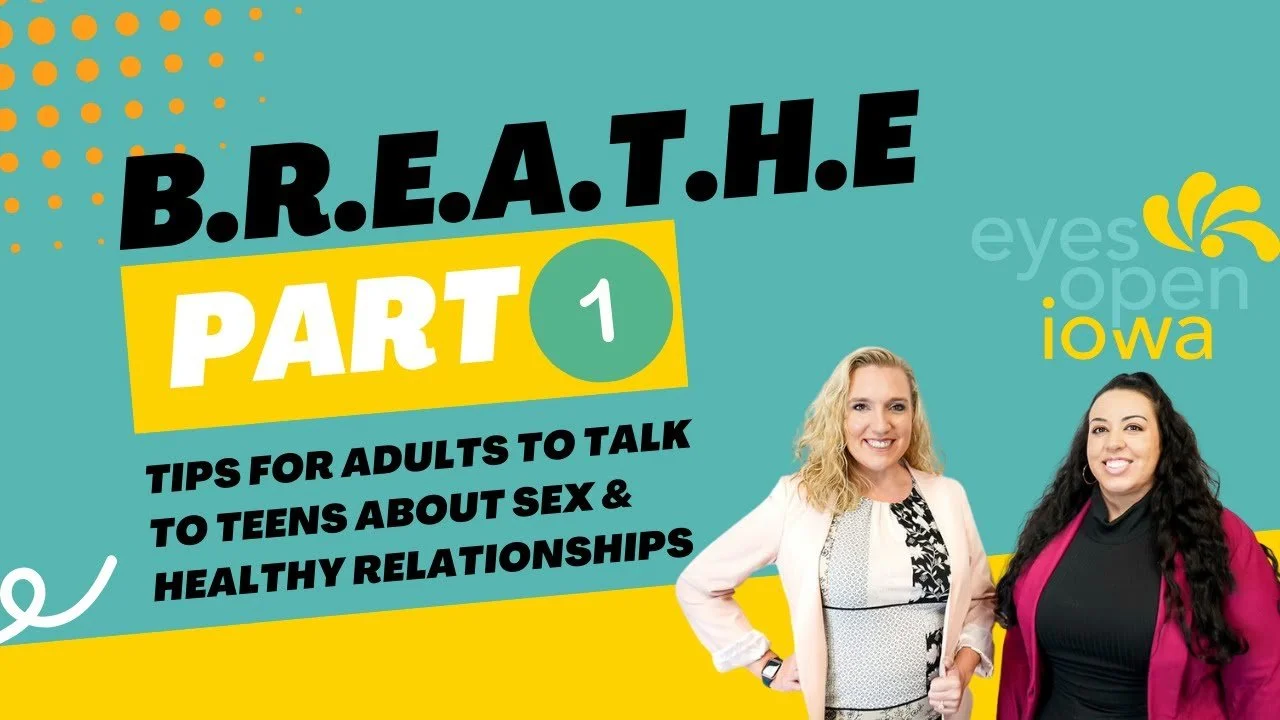“How do I start the talk?”
Talking with your teenager about sex
Teens report that the people they most want to hear from about birth control, relationships and sex is their parents! At EyesOpenIowa, we know it might feel awkward to have these conversations, and we got you!
The sexuality conversation is most effective when it takes place on a regular basis as your child grows up. At EyesOpenIowa we like to say, “Start the Talk and then keep the Conversation Going”. The most important thing a parent or caregiver can do is listen! Be supportive and encourage your teen to come to you with any questions or concerns, even the tough stuff! Here are some things to keep in mind:
Use teachable moments
Be present and give your teen your full attention
Provide factual information
Stress safety and love
EOI applauds your dedication and commitment to your family. And we are here to help you be ready to have “the talk” – and “conversations” – with the young person in your life.
To view the 2011-2021 Youth Risk Behavior Survey data, please click here.
Breathe - Take a deep breath and watch this YouTube playlist which features the EOI training department talking about how to feel more comfortable with these conversations. Breathe deep and remember your child wants to hear from you!
-
Q: What is appropriate for my child to know?
A: Each child is different, and you know your child the best. It’s important to always be honest, although children at this age don’t often need a lot of detail. Some topics that may come up are: proper names for body parts, how all living things reproduce, different kinds of family structures, how children have the right to tell others not to touch their body when they do not want to be touched, and how bullying and teasing are wrong.*
Q: Where can I go to help me learn?
A: It’s never too early to talk about Consent.
A: Teaching kids to set healthy boundaries - a focus on sharing.
A: Check out our friends at Amaze.org. There’s a whole library of short videos with parent discussion helps for talking with your young child.
-
Q: What is appropriate for my child to know?
A: Each child is different. It’s important to always be honest and to answer their questions directly. Some topics that may come up are: reproductive systems, differences in puberty experience, sexual orientation, human reproduction, characteristics of a healthy relationship, teasing, harassment, bullying, and sexual abuse and why they are wrong.
Q: Where can I go to help me learn?
A: It’s never too early to talk about Consent.
A: Teaching kids to set healthy boundaries - a focus on sharing.
A: Check out our friends at Amaze.org. There’s a whole library of short videos with parent discussion helps for talking with your young child.
-
Q: What is appropriate for my preteen to know?
A: Children in this age group are often getting information – and misinformation -from a variety of sources – including friends and the internet. It’s important to provide preteens with factual information. Here are some topics that may come up: sexual and reproductive systems, gender identity, gender expression, and sexual orientation, sexual intercourse, sexual abstinence, various contraception methods, pregnancy, STDs, healthy and unhealthy relationships technology and social media, bullying, sexual harassment, sexual abuse, sexual assault, incest, rape, dating violence and why they are wrong.*
Q: Where can I go to help me learn?
A: Check out our friends at Amaze.org. There’s a whole library of short videos with parent discussion helps for talking with your preteen.
A: 5 ways to improve communication with your teen.
A: Forget the Talk: it’s an ongoing conversation, parts 1 and part 2.
A: How comprehensive sex ed prevents sex abuse.
A: New rules in the digital age: Sexting.
Some other resources for talking with your teen:
EyesOpenIowa Let’s Talk Month Pop Culture guide.
Tips for How to Talk to Your Teens About Relationships and Their Sexual Health – Office of Population Affairs.
More resources from Amaze including hotline, email, and newsletter.
-
Q: What is appropriate for my teenager to know?
A: Teenagers have access to a lot of information and may be making sexual health decisions or soon will be. It’s important to provide teens with factual information. Here are some topics that may come up: biological sex, sexual orientation, gender identity and expression, advantages and disadvantages of abstinence and other contraception methods, laws related to reproductive and sexual health care services, common symptoms of STDs/STIs, sexual consent and its implications, social media in relationships, situations and behaviors that may constitute bullying sexual harassment, sexual abuse, sexual assault, incest, rape, and dating violence & analyze laws related to them.
Q: Where can I go to help me learn?
A: Check out our friends at Amaze.org. There’s a whole library of short videos with parent discussion helps for talking with your teenager.
A: 5 ways to improve communication with your teen.
A: Forget the Talk: it’s an ongoing conversation, parts 1 and part 2.
A: How comprehensive sex ed prevents sex abuse.
A: New rules in the digital age: Sexting.
Some other resources for talking with your teen:
EyesOpenIowa Let’s Talk Month Pop Culture guide
Tips for How to Talk to Your Teens About Relationships and Their Sexual Health – Office of Population Affairs.
More resources from Amaze including hotline, email, and newsletter.
-
Some things you may be wondering:
-
Get involved! Familiarize yourself with what your child’s school is teaching and what policies are in place. Sex ed is a on-going lesson that doesn’t take place with one talk but is most effective as a conversation that takes place on a regular basis.
-
Iowa's mandate provides the following definition of age appropriate: “Age appropriate means topics, messages and teaching methods suitable to particular ages or age groups of children and adolescents, based on developing cognitive, emotional, and behavioral capacity typical for the age or age group.”
-
Research clearly shows that comprehensive sex education programs do not encourage teens to start having sexual intercourse; do not increase the frequency with which teens have intercourse, and do not increase the number of a teen’s sexual partners. At the same time, evaluations of publicly funded abstinence-only programs have repeatedly shown no positive changes in sexual behaviors over time. Young people need honest, effective sex education – not ineffective, shame-based, abstinence-only programs.
-
Yes! There are numerous resources, tools, and guidance materials available through organizations such as Advocates for Youth, the National Campaign to Prevent Teen and Unplanned Pregnancies and Answer-Sex Ed Honestly. Please contact EyesOpenIowa if we can provide any assistance in this process.
“If you asked me, ‘If you were a parent right now, how would you educate your kids about sex?’ I would say that I want my kids to be able to approach me, and I would teach them about condoms. I would talk about getting checked for STDs and about consent. And I would want to talk to them about the emotional connection that comes with sex so that they understand that part.”
“I wish adults knew that every kid has a different path in life. Some become sexually active early and others wait longer. I wish they would have taught me more about it earlier in life and made me more aware of the dangers that come with sex and given me more information on how to be safe.”
*Information from the National Sexuality Standards, a Special Publication of the Journal of School Health, January 2012.


